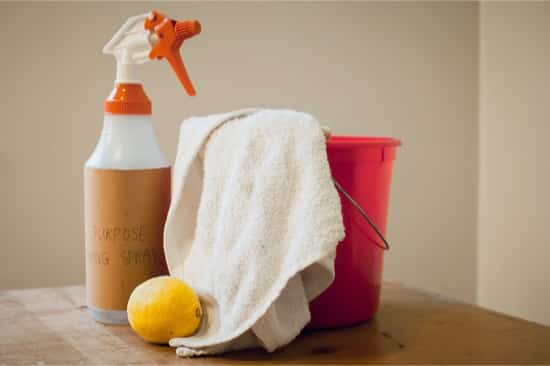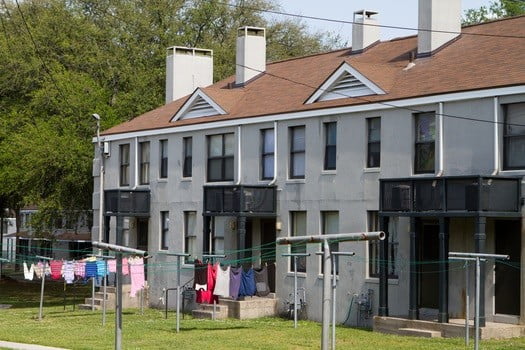You’ve got bed bugs, but little or no money. You might think that you have no options, but there are some good bed bug treatments for low-income families. Specific DIY methods work well, but you have to perform research to find out what is most likely to get fast and permanent results.
If you didn’t introduce bed bugs to the property, your landlord must pay to get rid of them. The same applies to Section 8 housing. Cheap DIY ways to kill bed bugs include homemade bed bug sprays, traps, and lures. But there are no exterminators that work for free, and no charities that kill bed bugs for free.
We’ll provide everything you need to know about cheap bed bug removal, including how to get bed bugs removed for free. We’ll then explain how to make a cheap homemade bed bug killer.
Bed Bugs and Low-Income Families
I have bed bugs but can’t afford an exterminator! There are thousands of people in the same situation. Bed bugs are cruel in that they regularly affect people who can’t afford to kill them.
This rule applies to people in public housing, like apartments. Bed bugs spread easily from one neighbor to another. Even if you get rid of them, bed bugs can quickly come back.
There are several reasons why people in low-income housing can’t treat them. The reason is that getting treatment is expensive. No matter which way you kill them, it costs a lot of money.
- Exterminators cost hundreds of dollars, maybe more depending on the treatment method
- Premade lures cost $50 to $100
- Pesticide sprays don’t cost much, but you may need to buy more than one
- Even for DIY methods, you still have to buy equipment or ingredients
How to Get Rid of Bed Bugs for Cheap
Hiring an exterminator is an option, but it has several downsides apart from the price:
- Bed bugs are becoming immune to pesticides
- There may not be many exterminators in your area
- The exterminators might be unprofessional
- You might not want to allow anyone in your home
This means that you have to think of other cheap ways to kill bed bugs. There are many, although they don’t always work. Let’s explore the various sources of help and assistance.
1) Can You Get Free Help with Bed Bugs?
There are several sources of free help with bed bugs. There are services designed to assist.
Start by contacting municipal or county government. Many cities across the U.S. offer free help for people with bed bugs, including:
- Free information packs on bed bug removal
- Free guidelines on how to get rid of bed bugs
- Registries of local pest control agencies, and their contact details
This information may not get rid of bed bugs, but it is a useful starting point. It helps you avoid any ineffective treatments. There are no bed bug charities that kill bed bugs for free.
Many pest control companies do offer free bed bug inspections, however. If you’re not sure that you have them, this is something you could take advantage of.
2) Join a Bed Bug Support Group
Bed bugs cause problems aside from their bites. Most people with bed bugs experience sleepless nights, anxiety, and depression. Some people go through PTSD as a result of infestation.
That’s why bed bug support groups exist. They help you with support when you need it most. But they can also help you get rid of your infestation. These groups exist both online and offline.

Besides support, these groups can help you identify whether you have bed bugs or not. Many cases of bed bugs are other bugs, or nothing at all. That’s especially the case if you’ve had bed bugs before and you’re worried about getting them again.
These groups also share tips on which DIY bed bug treatment options that work, and which don’t. This is crucial as many supposed DIY remedies, like borax and baking soda, don’t work.
3) Bed Bugs Section 8 Housing
Bed bugs are common in Section 8 housing. That’s because of high tenant turnover, and low incomes are making it impossible for people to treat bed bugs. Fortunately, there are government protections in place.
Section 8 housing is federally funded. This means that federal laws apply to it. The U.S. Department of Housing and Urban Development (HUD) is in charge of these laws.
These laws make it necessary for property owners to keep these properties in good condition. The specific laws related to bed bugs are found in Notice H 2012-5. These laws state that:
- HUD housing must be decent, safe, sanitary and in good repair
- HUD housing must have no evidence of insect infestation
- HUD recommends that staff be trained to identify bed bugs
- Periodic building inspections for bed bugs are mandatory in buildings with prior infestations
In the eyes of the law, it’s the property owner (also known as the Operator/Agent) that’s responsible. They’re the ones who have to treat the infestation, not you.
In response to an infestation, the O/A can request federal assistance. If they refuse to help despite clear evidence of infestation, you can sue.
4) Can You Find Cheap Bed Bug Exterminators?
Not all bed bug exterminators are expensive. Exterminators charge different prices because:
- They serve different areas, and their potential clients can’t afford big price tags
- They use different pesticides or treatment means to other exterminators
- They are more thorough or less thorough than other exterminators

You might find an exterminator within your price range. However, you shouldn’t select the cheapest exterminator you can find. If an exterminator is cheap, then this likely means they aren’t quite as good. They might cut corners. For example:
- They don’t take the time to check whether you have bed bugs
- They don’t perform a complete search, to identify where your infestation is
- They don’t seal off your home correctly, which means that bed bugs can escape
- They don’t spray each area thoroughly
You may pay half price. But the exterminator will only kill half the bed bugs. Infestations multiply, so it will return to normal soon. The only way to kill them is to kill them all quickly.
If you do choose to pay for an exterminator, pay for heat treatment. This is a new way to kill bed bugs. Rather than use pesticide, the exterminator heats your home to more than 140 degrees. This kills both bed bugs and their eggs.
Heat treatments are more effective than pesticides.
5) Does Your Landlord Pay for Bed Bug Treatment?
The exact law on landlord responsibility for bed bugs. However, many states have laws about bed bugs. Most states’ laws make them the landlord’s responsibility.
The implied warranty of habitability makes it a tenant’s right to receive:
- A property that meets local safety codes
- Windows and doors that are secure
- Functioning electricity and plumbing
- Functioning smoke detectors
- Functioning heating
- Hot and cold potable water
- A property free of pests
The implied warranty of habitability is implied because it applies whether it’s in the lease or not. It doesn’t have to be specifically included. It applies in every U.S. state apart from Arkansas. Both the tenant and the landlord have to maintain the property in this condition.
What this means is that the bed bugs are your responsibility if you introduced them. If the bed bugs are not your fault, the landlord must pay to get rid of them. This is enforceable in a court of law. The only issue is that it’s difficult to prove who introduced the bed bugs.
Cheap Homemade Bed Bug Killer
Even if it is the landlord’s responsibility to kill bed bugs, it will take time. It’s frustrating to have to endure their bites. In the meantime, you could consider making your own spray.
Bed bug mattress sprays have to contain ingredients that kill bed bugs. But that doesn’t mean you have to use a synthetic pesticide. There are natural ingredients that work too. Many of these are entirely harmless to you, your family, and pets.
Homemade Bed Bug Spray Ingredients
The base of your spray will be water. The more concentrated the spray, the more effective it is pound for pound. But you also need to spray it as widely as possible, which is why you need water.
There are several ingredients which work, and several that don’t. Those that work include:
- Tea tree oil. Tea tree spray causes a toxic reaction in bed bugs and many other animals.
- Peppermint oil. Works like tea tree, but isn’t as effective.
- Silicone oil. These are used as lubricants, but can also kill bed bugs.
According to the Journal of Economic Entomology, silicone oil is the most effective of these. It’s best to stick to ingredients which are proven to work. There are however several potential ingredients which work, but shouldn’t be used. These include:
- Rubbing alcohol. Alcohol kills on contact, but is a fire hazard when sprayed around the home.
- Other essential oils. Most essential oils have an effect, but few kill bed bugs as well as tea tree.
- Vinegar. Aside from the smell, the power of vinegar to kill bed bugs is overstated.
You will also need a spray bottle. Pick one that creates a fine mist. The finer the mist, the more area the spray will reach, and the longer it will last.
How to Make Homemade Bed Bug Spray
Making a DIY bed bug spray is easy, and the result can be effective. Start by picking one of the ingredients listed above. Which you pick is up to personal preference.
Take your spray bottle and put in the active ingredient. The exact amount depends on the dilution ratio you need. For essential oils, 5% is a good dilution rate.
Because oil doesn’t mix well with water, you’ll need a dispersant. A drop of dish soap will help your oil mix with the water. Dish soap kills bed bugs too.

How to Use a DIY Bed Bug Spray
Homemade sprays work on contact. This means that you have to spray the bed bug directly for it to work. So, begin by finding where your bed bugs are. They’re likely to be:
- On the underside of your mattress
- Underneath nearby furniture, e.g., bedside cabinets and wardrobes
- In cracks in the wall, floor or furniture
Seal off the room you’re going to treat, and begin searching. Any bed bug you see, give them a spray. Bed bugs move quickly when disturbed, so keep your spray ready.
You should repeat this process frequently. DIY sprays don’t stick to surfaces; they evaporate instead. You need to spray every bed bug to get rid of the infestation.
Do DIY Bed Bug Sprays Work?
DIY sprays are reasonably effective. A tea tree oil spray kills bed bugs on direct contact, and has a slight repellent effect. You can at least kill some bed bugs, with only a little effort.
The issue is that considering the cost and effort involved, it’s better to buy a premade spray. Pesticide sprays have several advantages over DIY ones, including:
- The pesticides linger and kill bed bugs for weeks. You have to respray with DIY sprays.
- DIY sprays only kill on direct contact. Pesticides stick to surfaces, and kill bed bugs that walk over them.
- It’s much less effort to buy a spray than make one.
When you’re killing bed bugs, you have to try and kill them all. Killing a few is no use at all. Bed bugs breed quickly, so unless you kill them all, they’ll quickly re-establish the infestation.
How to Make a Homemade Bed Bug Lure
Your other option is to make a homemade bed bug lure. Bed bugs are attracted to heat, carbon dioxide and the smell of people. You can take advantage of that by creating a lure.
A bed bug researcher named Dr. Changlu Wang came up with the idea for a DIY lure. All you need to make it are:
- A dog bowl (the kind with two dishes is best)
- Regular sugar
- Dried yeast
- Faucet water
- A jug that can fit one and a half quarts
You can find these ingredients at any store, and it’s likely you already have some lying around. This is what you do:
- Take the dog bowl, and flip it upside down.
- Fill the jug with ten tablespoons/150g of sugar. Add two tablespoons of yeast.
- Fill the jug with one and a half quarts of water.
- Stir the mixture until everything is dissolved.
- Place the lure on top of the dog bowl.
Do this last thing before bed, and place the lure near your bed. What happens is that the yeast eats the sugar, and produces carbon dioxide. CO2 is one of the things that attract bed bugs.
If you’re worried about carbon dioxide, don’t be. This lure creates the same CO2 as a sleeping person (the perfect amount).
It’s also possible to buy premade bed bug lures. However, those currently on the market cost $50 or more. The DIY version described above does the same thing, but for much cheaper.


I am on a fixed income. I paid 600 dollars for an exterminator to treat my home. I was guaranteed 3 treatments plus one additional treatment if they were still in my home. Throughout the three treatments as well as after I told the exterminator I was still being bitten. The Third treatment was done September 11 and I’ve been being bitten everyday since. The exterminator says it’s not bed bugs they are all dead and refused to do the guaranteed last treatment. He’s blamed the new bites on everything from gnats to irritated hair follicles. I dont know what to do.
I need help to get rid of bed bugs my husband is highly allergic to them and I can not afford to get it done
I am an elderly handicapped person, who has been infested with bed bugs. I am on a very limited income of 800 dollars a month through SS & SSI, and have to pay my landlord back a sum of $1900.00 for hiring an exterminator to come and do a heat treatment on my mobile home..(which was done yesterday). And today I am still seeing live bed bugs in my home… I can’t take it anymore, and don’t know what to do now..But know that i can’t afford anymore to get rid of these things once and for all. PLEASE HELP ME.!!! WHAT CAN I DO NOW?????
I dont have money for exterminator what can I do to get rid of bed bug
Look up landlord tenent laws. Unless it is stated in your lease that u have to pay for pest control issues then it is not your responsibility the landlord has to provide a safe and pest free invierment for their tenants.
I agree with all of your concerns, that even if you did not introduce the bed bugs into your apartment and can not prove it, some landlord tenant laws depending on your state you live in and your lease contract says you are responsible. I do not see how anyone can afford a heat treatment that does not guarantee past their warranty to completely get rid of them. If you are on a fixed income SSI/Disabilty have no credit or savings, or anyone to can borrow money from, $1800 to $1900 is absurd. The apartment complex only contracts with one company and if you report you have bedbugs and they find any surrounding units to yours that has bed bugs you have to pay for their units too, even if they can’t prove they came from your unit to begin with. This is the silent killer that we all deal with. Report to the landlord that you have bedbugs and you are liable for all. You can’t hire a separate company for less money because they have a contract with the apartment complex. Catch 22. I really do not see how anyone that rents can afford this.
Agreed. It is terrible. I wonder if there’s a medication we could take to make us repel them? If some are saying the heat treatments aren’t even successful, what can people do??
In the state of Iowa is it the landlords responsibility to get rid of them?